Cláudio's Best Shot Pick: Fire Island (2022)
 Wednesday, June 8, 2022 at 9:30PM
Wednesday, June 8, 2022 at 9:30PM The next episode in our series, 'Hit Me With Your Best Shot,' arrives Thursday night. This week's film is Andrew Ahn's Fire Island, which recently premiered on Hulu. You still have time to participate! In the meantime, here's Cláudio's entry:
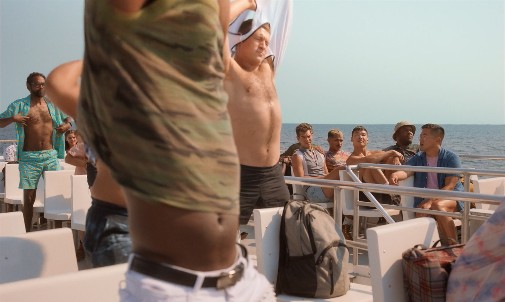
For the past decade or so, numerous filmmakers have tried to revive the romantic comedy with varying degrees of success. And yet, it seems that the romcom's heyday will never return. Still, there's plenty of nostalgia for those days gone by when mid-budget projects of this ilk were a mainstay of any studio's output. Nowadays, every such exercise feels like an exception to the rule, a precious rarity, and a throwback. Maybe that's why the modern romcom refuses to stick, as it often comes off as a retrospective homage rather than its own thing. Or else it's too focused on justifying its existence, wanting to appear cool and hip with such alarming vehemence it ends up forgetting the basics that make these movies work.
By centering identities rarely depicted in mainstream cinema, appealing to classic literature tropes, and getting a director with a strong point of view, Fire Island avoids most of these pitfalls. It succeeds where others have stumbled, and even if it doesn't revive the romcom's Golden Age, it's pleasant summer entertainment…
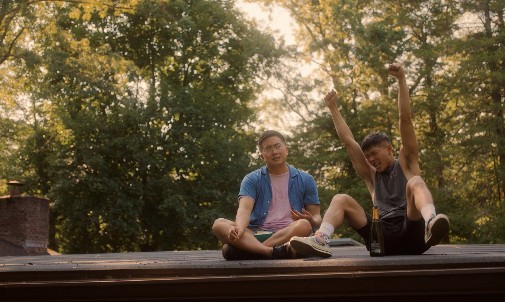
As a Jane Austen aficionado, I came into the film with high expectations. Though the trailer didn't seem all that promising, the prospect of an updated take on Pride & Prejudice felt like a brilliant idea. After all, other movies have done it well, and many common romantic comedy archetypes and mechanisms can be traced to Austen's oeuvre in general, Pride & Prejudice in particular. However, what surprised me most about Fire Island was how it didn't just wink in the classic novel's general direction, only flirting with its ideas and never engaging with them. Instead, the picture is a sincere adaptation.
Joel Kim Booster's script is well aware of a truth that should be universally acknowledged about Austen's writings, though it rarely gets mentioned. Far above being romantic tales, her novels were scathing social commentary, observational comedies that pointed accusatory fingers at the absurdities of polite society. Booster takes this concept and runs with it, trading Regency England for 21st-century American gay culture. Sure, there are no corsets and dowries to consider, but this milieu is rich with its own nonsensical rules and skewed values. There's an evident exploration of racism within the community, but Booster goes further, focusing on such ideas as non-consensual porn, painful beauty standards, self-image issues, and more.
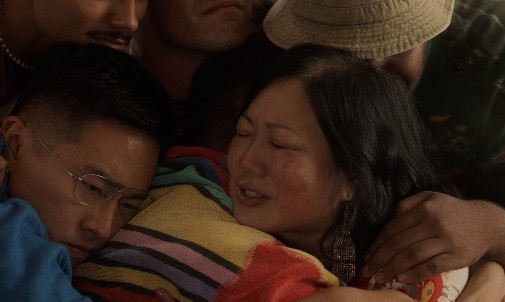
Sure, he makes the audience laugh, but there's also a clear purpose to the cutting jabs, an attempt at using narrative as a scalpel to dissect the status quo. The results aren't perfect, and I sometimes wish Booster had gone further still, but the strive for satirical comedy is appreciated. Moreover, the writer understands that Pride & Prejudice revolves around the courting dynamic of two deeply flawed people. The Elizabeth Bennet analog (Noah), played by Booster, is far from idealized, embodying the titular prejudices. For his part, Conrad Ricamora is spot-on as a proud modern-day Mr. Darcy (Will). That last piece of casting is distractingly perfect, and it was difficult not to dedicate this Hit Me With Your Best Shot write-up entirely to Ricamora.
Whether blinded by thirst or talent, I took dozens upon dozens of screenshots, so here are a few that caught my eye:
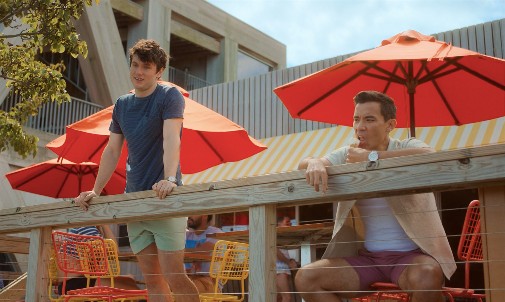
Don't you love the petulant aggression with which he licks that poor innocent ice cream? Also, why am I suddenly jealous of frozen desserts?
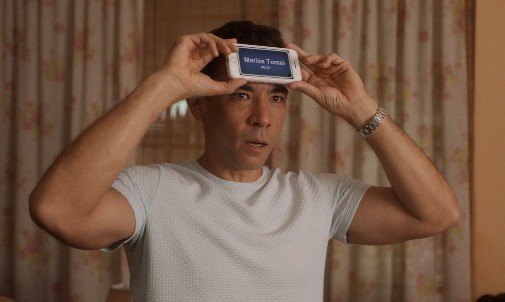
You can see the glimmers of panic when faced with hostile faggotry in the form of Marisa Tomei-stanning. It's maybe the movie's best joke.
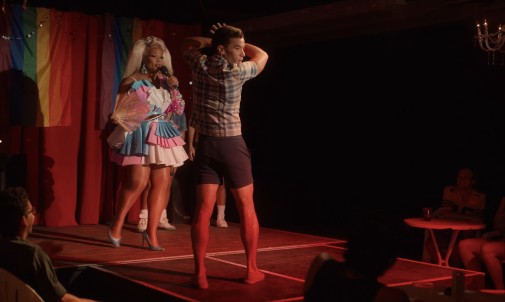
The man's attempts at sexy dancing are equally appreciated, a little miracle of endearing awkwardness.
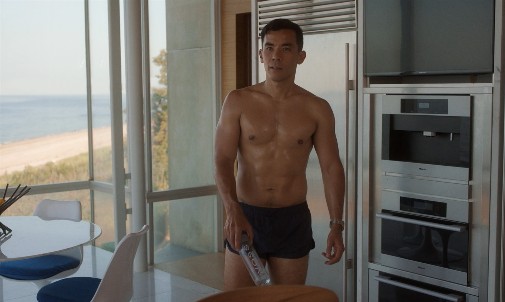
This one's here because he's hot. Apologies for my shallowness – sorry, not sorry.
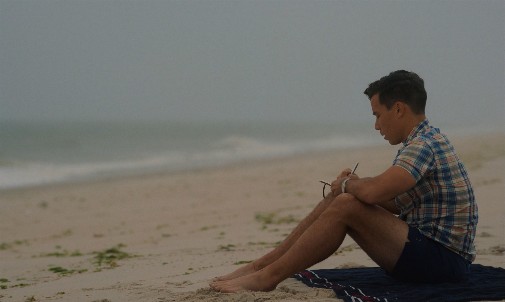
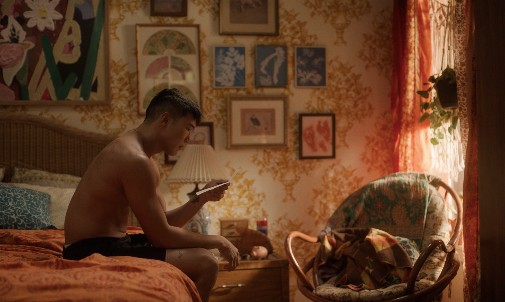
Finally, the letter-writing scene is an example of filmic virtuosity, two unbalanced shots whose mirrored emptiness begs to be filled – romance expressed through formal means alone. It's simple filmmaking but wonderfully effective.
Beyond the astute script – I could have lost that unnecessary narration – and the splendid cast – Bowen Yang is the MVP, by the way – Fire Island owes its success to director Andrew Ahn. After Spa Night and Driveways, this unapologetically gay romcom represents a departure and a continuation of the artist's preoccupations. There's a low-key loveliness to the environments Ahn evokes, a sense of serenity out of time that's perfect for a place where chronology feels loose and somewhat wrong. In his cinema, any melodramatic contrivances are thus grounded in realism. He also allows synthetic artifice to exist as an extension of the characters rather than a glossy veneer superimposed on their authentic selves.
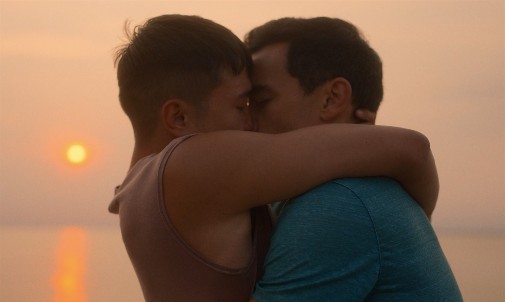
Most of all, Fire Island exists as a pocket of Eden-like serenity, filmed by cinematographer Felipe Vara de Rey to look gauzy soft, warm and inviting, if occasionally melancholic. Scenes down on the pier are especially stunning, making great use of the natural landscape and celestial ceilings. The sunset leitmotiv recalls Rohmer's The Green Ray and Linklater's Before Midnight, introducing a friend group's eccentricities and later framing the happy ending that's maybe forever, maybe just until the next sunrise - it's joyful either way. Indeed, such scenes are enough to warm a cynical moviegoer's heart and make one believe in the magic of on-screen romance.
However, those sun-kissed shots feel a little too obvious for my liking. And so, pick for Fire Island's best shot goes to an image that evokes twilight gold and brings it into the erotic embrace of nighttime hedonism. When shooting Elizabeth Bennet and Mr. Darcy's first dance, Joe Wright made the surrounding people evanesce into nothingness, their connection illustrated through symbolic isolation. Andrew Ahn also makes the world disappear when Noah and Will meet on the dance floor. However, he does it by moving the camera closer, intimacy established through framing. As their heads approach and a kiss seems eminent, the cold hues of club lighting get broken by sudden warmth, as if the swell of desire woke the sun up from its slumber.
It's gorgeous and uncomplicated, a perfect shot of cinematic romance with a queer twist and an aestival vibe. Also, seeing guys as handsome as Booster and Ricamora getting drunk in each other's presence is freaking hot. Sometimes, that's enough. Sometimes, that's just as good as Regency-era social satyre.
Don't forget to post your #bestshot choices from Fire Island so that Nathaniel can include them in tomorrow's Best Shot post.



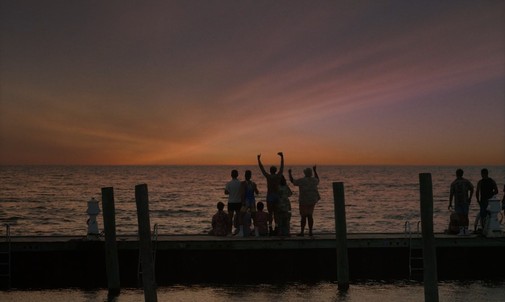
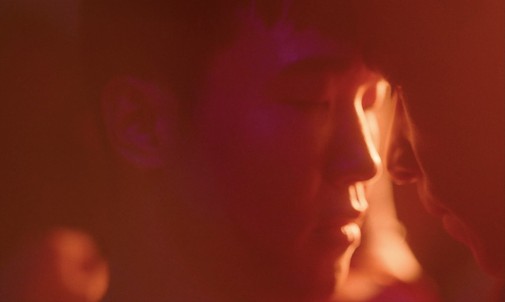
Reader Comments (3)
Haven't read your post because don't want to be influenced for my choices, but have to repeat the refrain... Conrad Ricamora is so hot. So glad I was able to see him in Little Shop of Horrors a couple months ago.
Finally read your post all the way through and YES THE DANCING and the world falling away. Exactly! Me too! No notes.
Thanks for sharing such a helpful instruction, really appreciate for your article.
Indigo Card